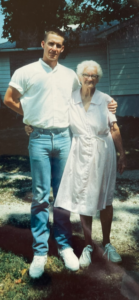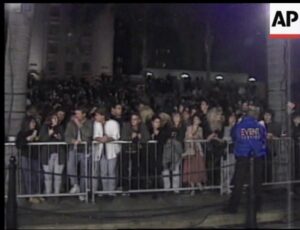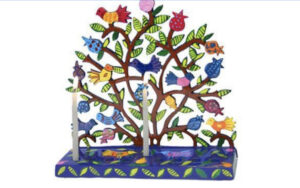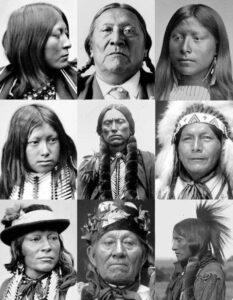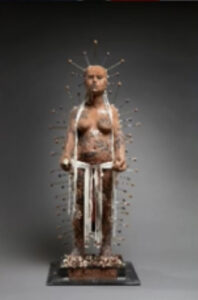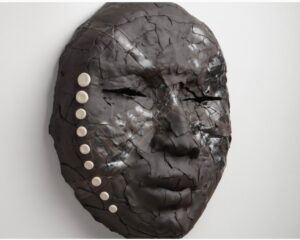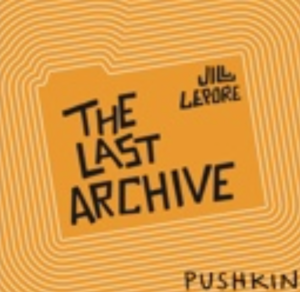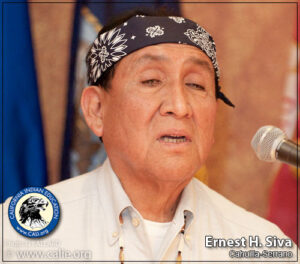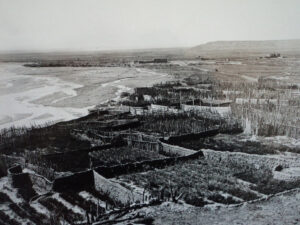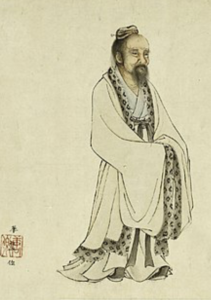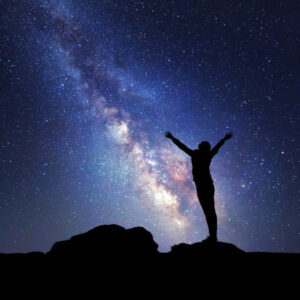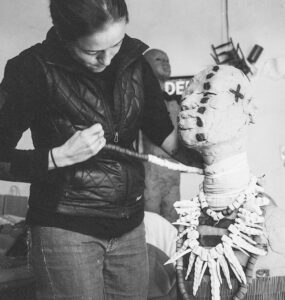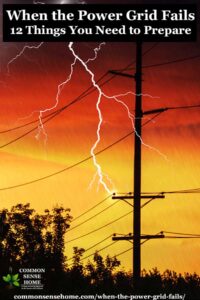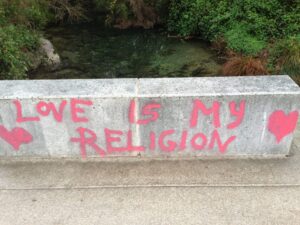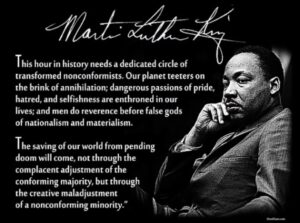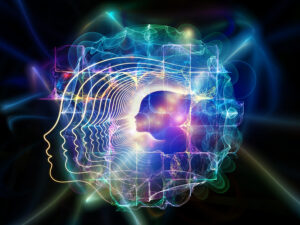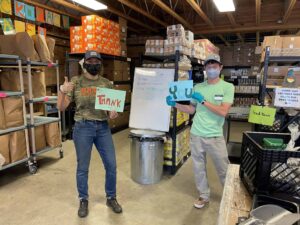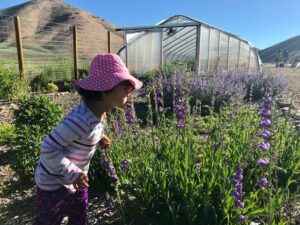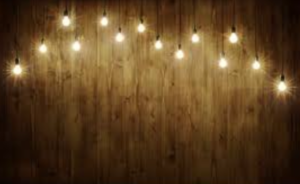Darrell Lee Ohlau
November 30, 2021Today would have been my brother’s 58th birthday.
I love you, Darrell Lee. Led Zeppelin and Miles Davis on the turntable. Freshly frosted birthday cake. You are infinitely loved, and missed, everyday. You are with me. Always.
Darrell with our great-grandmother, Alma Evelo Latta, in her backyard in Sparta, Illinois. ♥
A screen capture after serendipitously being prompted recently to look for video from the grand opening of Planet Hollywood in San Diego, March, 1995…my radio days. Darrell is on the right (in white), and my kids’ dad, Billy Ashfield on his left, working the rope line. :)
Sweet boy.
Darrell Lee Ohlau
November 30, 1963 – January 5th, 2000
Show us your light.
November 29, 2021‘We enter a season that invites us into the story of the people of Israel. We join them in spirit during their protracted wait for the promised Savior.’
~Cindy Senarighi and Heidi Green
Inhale, I Am
Exhale, Grateful
‘As our Covid months turn into years, we realize that our practice is a long unfolding, an opening into promise.’
~Rolph Gates
Take a deep breath, knowing that what we don’t say can be as powerful as what we do say, thinking deeply about something before making a response—such actions leave room for the spirit to flow, to harmonize our circumstances and move them in a more positive direction.
~Marianne Williamson
For Stephen.
November 27, 2021And my dad.
Send In the Clowns” is a song written by Stephen Sondheim for the 1973 musical A Little Night Music, an adaptation of Ingmar Bergman’s 1955 film Smiles of a Summer Night. It is a ballad from Act Two, in which the character Desirée reflects on the ironies and disappointments of her life.
Don’t miss Tick, Tick…BOOM! on Netflix. Profound film making with tender references to Stephen.
#NativeAmericanHeritageDay
November 26, 2021“Native Americans are the keepers of traditions and defenders of our natural resources. This Native American Heritage Day, I honor our culture and our ancestors. At the Interior, we will continue to include Indigenous knowledge as we protect our lands for future generations.”
-Secretary Deb Haaland, 54th Secretary of the Interior, 35th generation New Mexican, Pueblo of Laguna Tribe
[Image: Lakota Man/Twitter]
‘That’s what gods do, they spin threads of ruin through the fabric of our lives, all to make songs for generations to come.’ -Anthony Doerr ‘Cloud Cuckoo Land’, p.439
Post
C
o
l
o
n
i
a
l
Stress
D
i
s
o
r
d
e
r
PCSD
“We’re still in the genocide. It’s still happening; we’re still doing it.”
Why?
We need to look at our “individual power in relation to the world.” -Rose
Rilke: “…blessed our those who stood quietly in the rain. Theirs shall be the harvest; for them the fruits. They will outlast pomp and power, whose meaning and structures will crumble. When all else is exhausted and bled of purpose, they will lift their hands, they have survived.”
Mixed-media artist Rose B. Simpson lives and works from her home at Santa Clara Pueblo in New Mexico.
(This piece was commissioned for the the Conspire conference, Center for Action and Contemplation, in New Mexico.)
https://www.rosebsimpson.com/about
[Rose B. Simpson, Holding it Together (detail), 2016, sculpture]
Mitákuye Oyás’iŋ
All our relations
The Last Archive
Jill Lepore, historian and Harvard professor
“Indigenous paradigm, a paradigm about relationships–all things are kin, rocks the skies, trees, family…”
https://podcasts.apple.com/us/podcast/the-last-archive/id1506207997?i=1000540005084
LATIMES
“The Indigenous Serrano Language Was All But Gone, This Man is Resurrecting It.”
When Ernest Siva was a boy on the Morongo Reservation in Riverside County, he listened to the music and stories of his ancestors, who had lived in Southern California long before the land was called by that name.
He recalls running around a ceremonial fire on the reservation at age 5 as a weeklong ceremony honoring those who had died the previous year culminated with the burning of images in their likeness. Dollar bills and coins were thrown into the fire in tribute as tribal elders sang songs reserved for special occasions. Siva and his cousin chased after the singed money that fluttered out of the flames, largely ignoring the traditional lyrics in the background.
The specific words and rhythms are now distant memories for the 84-year-old Siva, a Cahuilla/Serrano Native American.
Siva is working to change that. For the last 25 years, the Banning resident has been a tribal historian with the Morongo Band of Mission Indians.
CIVIL EATS
In the face of climate change and persistent droughts, a growing number of people from Zuni Pueblo in New Mexico and elsewhere are adopting the traditional farming practice.
Historic Zuni waffle gardens, circa 1919. (Photo courtesy of Kirk Bemis)
“It’s going to be difficult, but in the meantime, we still have to do what we can to find ways to adapt and live with it. And I think that the waffle gardens are one tool for us to make it through.”
(The) hope is for every household within the Zuni village to have a backyard garden, and that such a shift could cut a family’s need to shop for groceries in half.
“A small, 4-by-8 [foot] garden will get you a good four to five buckets full of corn, which is not enough to completely live off, but enough to feed our families, survive, and carry out our traditions.” He also thinks it’s important for the Zuni people to lessen dependence on grocery stores, which the pandemic showed are vulnerable to supply chain disruptions.
https://civileats.com/2021/10/26/resurgence-waffle-gardens-helping-indigenous-peoples-thrive-amid-droughts-grow-food-less-water/
Maria Popova
The Marginalian
“Ever since we climbed down from the trees, we have been looking up to them to understand ourselves and our place in the universe. “Nothing is holier, nothing is more exemplary than a beautiful, strong tree,” Hermann Hesse wrote a century ago in his sublime sylvan love letter, affirming that “when we have learned how to listen to trees, then the brevity and the quickness and the childlike hastiness of our thoughts achieve an incomparable joy.”
Centuries, millennia before Hesse — before Wangari Maathai won the Nobel Prize for her courageously enacted conviction that “a tree is a little bit of the future,” before scientists uncovered the astonishing language of trees, before Western artists saw in tree silhouettes a Rorschach test for what we are — the indigenous artists and storytellers of the Gond tribe in central India have been reverencing the secret lives of trees as portals into the inner life of nature, into the wildness of our own nature, into a supra-natural universe of myth and magic.”
The Secret Life of Trees: Stunning Sylvan Drawings by Indigenous Artists Based on Indian Mythology
Thanks + Giving
Science of Mind
‘Stop and contemplate the reality that every single thing right now around us–every chair, rug, lamp and table–was first an idea, and then someone set about to make it. Every piece of art, every movie, book and video game was first an idea, and then someone followed the inspiration and created it. Every moment of laughter, every conversation, every connection between us is first an impulse of love, and then we decide to be part of it. Every child, every smile, every time we hold hands, overcome a challenge and thrive beyond a heartbreak is an expression of life. Even a weed poking through the concrete or the act of sitting by a deathbed can be a sacred moment when we behold life and are grateful.’
Louis Armstrong, What a Wonderful World, spoken intro.
“What a Wonderful World” [1970 Spoken Introduction Version] along with Oliver Nelson’s Orchestra is a song written by Bob Thiele (as George Douglas) and George David Weiss. It was first recorded by Louis Armstrong and released as a single in 1967. Thiele and Weiss were both prominent in the music world (Thiele as a producer and Weiss as a composer/performer). Armstrong’s recording was inducted in the Grammy Hall of Fame in 1999. Intended as an antidote for the increasingly racially and politically charged climate of everyday life in the United States, the song also has a hopeful, optimistic tone with regard to the future, with reference to babies being born into the world and having much to look forward to. The song was initially offered to Tony Bennett, who turned it down. Thereafter, it was offered to Louis Armstrong. -RoundMidnightTV
The Way of Chaung Tzu [Thomas Merton]
In the age when life on earth was full, no one paid any special attention to worthy men, nor did they single out the man of ability.
Rulers were simply the highest branches on the tree, and the people were like deer in the woods. They were honest and righteous without realizing that they were ‘doing their duty.’
they loved each other and did not know that this was ‘love of neighbor.’ They deceived no one, yet they did not know they were ‘ben to are trusted.’
They were reliable and did not know that this was ‘good faith.’ they lived freely together giving and taking, and did not know that they were generous. For this reason their deeds have not been narrated. They made no history.
They simply lived, lived simply, in the TAO of being. -dayle
“On this side of death we play roles. So long as we seek to please the audience, death, who needs no approval, plays us.” -Rilke
Matt Haig, author and journalist:
Look at the sky; remind yourself of the cosmos. Seek vastness at every opportunity in order to see the smallness of yourself.
“Today, say grace thinking about the Earth, about every plant, animal and person who made it possible to enjoy the things you are grateful for. Recognize this as Spirit’s Grace during Itself into and through all creation.”
-Science of Mind
R A I N
November 14, 2021Dear Beloved,
In the midst of my pain, give me comfort.
In the midst of my sorrow, give me peace.
In the midst of my brokenness, give me wings.
For You are the author of miracles
and I need one now.
We are spirit and thus we are more than the world.
-Marianne Williamson
Center for Action and Contemplation, New Mexico
Cultivating Radical Compassion
Author Tara Brach is a skilled psychotherapist and meditation teacher who has developed countless ways to help her students transform their suffering not only for their own sake but on behalf of the world. Over the last seventeen years she has focused particularly on the RAIN meditation practice, [1] which “cultivates a trust in our own basic goodness and by extension helps us recognize and trust that same light shining through all beings.” Brach suggests:
When you are caught in difficult emotions, the RAIN meditation can bring you back to a wise and compassionate presence. Give yourself a few moments to pause and turn inward.
R Recognize what is happening. Mentally whisper whatever you are aware of: fear, anger, hurt, shame.
A Allow. Let whatever you are feeling be here, without judging it, trying to fix it, or ignoring it. Simply pause and “let be.” You might whisper “This too belongs.”
I Investigate. With curiosity, feel into your body—your throat, chest, belly. Discover where the emotions live inside you. You might gently place a hand wherever feelings are strongest. Sense what is needed or being asked for right now. Is it love? Forgiveness? Acceptance? Understanding?
N Nurture. Offer care to feelings of vulnerability, hurt, or fear. Let the touch of your hand be tender, and send whatever message might most offer healing. You can imagine this coming from your own awake heart or from another being (friend, grandparent, spiritual figure, dog) you trust and love.
After the RAIN: Take some moments in stillness, simply sensing the quality of presence that has unfolded. Notice the shift from when you started (an angry or fearful or victimized self) to the compassionate awareness that is always here.
[1] To learn more about the RAIN meditation, see Tara Brach’s book Radical Compassion: Learning to Love Yourself and Your World with the Practice of RAIN (Viking: 2019). For online RAIN resources, visit tarabrach.com/RAIN.
Image Inspiration: This piece is of a series of reclamation and it’s about finding our identities and our empowerment in our histories and stories and timelines and how do we apply that to our beings in order to become whole.
Image credit: Rose B. Simpson, Reclamation II (detail), 2018, sculpture.
“The Center for Action and Contemplation featured the artist of these sculptures, Rose B. Simpson, at our recent CONSPIRE conference—so many of us were impacted by her creations that we decided to share her work with our Daily Meditations community for the month of November.”
—Rose B. Simpson, CONSPIRE Interview, 2021
Pachamama
November 11, 2021Sanskrit: Utkata Konasana
Western Term: Goddess or Victory
English Translation: Fierce Angle Pose
Type of Asana: Standing Pose and a fierce pose that connects to the divine feminine.
To put the world right in order we must first put the nation in order; to put the nation in order, we must first put the family in order; to put the family in order, we must first cultivate our personal life; we must first set our hearts right.
~Confucius
❧
The Eagle and The Condor Prophecy
“The Eagle and the Condor is an ancient prophecy that speaks of human societies splitting into two paths—that of the Eagle, and that of the Condor.
The path of the Condor is the path of heart, of intuition, and of the feminine. The path of the Eagle is the path of the mind, of the industrial, and of the masculine.
Read about the importance of balancing feminine and masculine energies.
The Eagle and Condor prophecy says that the 1490s would begin a 500-year period during during which the Eagle people would become so powerful that they would nearly drive the Condor people out of existence. This can be seen in the conquering of the Americas and the killing and oppressing of the indigenous peoples in the subsequent 500 years—up to and including today.
The prophecy says that during the next 500-year period, beginning in 1990, the potential would arise for the Eagle and the Condor to come together, to fly in the same sky, and to create a new level of consciousness for humanity. The prophecy only speaks of the potential, so it’s up to humanity to activate this potential and ensure that a new consciousness is allowed to arise.”
As the years pass, I unearth layer after layer of the habitual thinking that caused me suffering. Most of it would be considered pathological in a clinical sense. It is simply the typical thinking of my culture, class, gender, time, and space, and I have internalized all of it.
I am also encountering the stored memories of many lifetimes. The experience is akin to cleaning out your grandmother’s attic and discovering, amongst the trunks and boxes, some clues to your family’s behavior.
My years on the [planet] have revealed to me, first, that I have suffered profoundly by allowing the flawed thinking of the world, [others], to define me, and second, that there has always been a part of me that has known better. I think of the part of me as sanity.
-Rolf Gates
Origin Story
November 9, 2021[Books published on 11.16.]
“Perhaps, as Jones suggests, we are a nation of argument that has been fooled all these years, through the exclusionary mythmaking of an elite few, into thinking we were a nation of consensus. Our present turmoil suggests as much.”
New York Times Magazine
The 1619 Project and the Long Battle Over U.S. History
“The book [11.16] will kick up a new round of debates. Years of careful consensus-building around national history standards did nothing to forestall the eruption. But in a sense, these arguments themselves may represent the apotheosis of our historiography. -Jake Silverstein
“Is history a science or a patriotic art?” -Nikole Hannah-Jones
This book, which is called “The 1619 Project: A New Origin Story,” arrives amid a prolonged debate over the version of the project we published two years ago. That project made a bold claim, which remains the central idea of the book: that the moment in August 1619 when the first enslaved Africans arrived in the English colonies that would become the United States could, in a sense, be considered the country’s origin.
The reasoning behind this is simple: Enslavement is not marginal to the history of the United States; it is inextricable. So many of our traditions and institutions were shaped by slavery, and so many of our persistent racial inequalities stem from its enduring legacy. Identifying the start of such a vast and complex system is a somewhat symbolic act. It was not until the late 1600s that slavery became codified with new laws in various colonies that firmly established the institution’s racial basis and dehumanizing structure. But 1619 marks the earliest beginnings of what would become this system. (It also could be said to mark the earliest beginnings of what would become American democracy: In July of that year, just weeks before the White Lion arrived in Point Comfort with its human cargo, the Virginia General Assembly was called to order, the first elected legislative body in English America.)
“History is a science, a social science, but it’s also politics,” the historian Martha S. Jones, who contributed a chapter in the new 1619 book, told me. “And Black historians have always known that. They always know the stakes. In a world that would brand Africans as people without a history, Williams understood the political consequence of the assertion that Black people have history and might even be driving it.”
Democracy, we are often told, requires a free press, one that will hold power to account. Does it also require a robust historical profession, free to ramify in a hundred directions at once, not all of them inspiring? Or in this regard do journalism and history differ, with journalism providing democracy its greatest service when most unshackled and critical, while history operates best with the sense of decorum and tradition that foments civic pride?
The answer may lie in another of history’s purposes, one that draws it closer to a core mission of journalism: to explain how we have arrived at the world we inhabit. “History is worth writing and studying primarily because of its power to shape our thinking about our present and future,” Gary Nash wrote. With this purpose in mind, the upheaval in American history seems less like a destabilizing force and more like a movement toward transparency, a clearing away of spin.
With any luck, our descendants will see the past from a more propitious perspective than our own. But we can perceive it only from our present reality: a nation plagued by rampant inequality and racial injustice, bitterly divided in its politics and incapable of achieving unity on public-health goals or the existential demands of climate change.
[Click on the image above to retrieve the article.]
23 Minute Must See Tutorial
Last Week Tonight with John Oliver
“The physical generation of renewable energy isn’t really the problem here,” Oliver explained. “The key issue is the transmission of it. Basically, how do you get that energy from where it’s made, like a wind farm in Wyoming, to where it is needed, which could be a thousand miles away.”
The Guardian
The answer is transmission lines, “the absolute heart of our grid, and we’re going to need more of them”, said Oliver. But there are several difficulties to refreshed transmission lines, starting with location: building hundreds of miles of lines is a logistical nightmare, and local opposition to bigger towers can derail plans for years.
Basically, how do you get that energy from where it’s made, like a wind farm in Wyoming, to where it is needed, which could be a thousand miles away.”
“But the key thing going forward here might be to start thinking about this differently than we currently are, because for far too long, whenever we’ve experienced blackouts, we tend to think of it as the power gird ‘failing’. But the truth is, it’s not failing us; we are failing it, by asking it to do something it was not designed to do, in conditions that it was not designed to handle.”
https://www.theguardian.com/tv-and-radio/2021/nov/08/john-oliver-us-power-grid
Complimentary reading:
In this New York Times bestselling investigation, Ted Koppel reveals that a major cyberattack on America’s power grid is not only possible but likely, that it would be devastating, and that the United States is shockingly unprepared.
“Imagine a blackout lasting not days, but weeks or months. Tens of millions of people over several states are affected. For those without access to a generator, there is no running water, no sewage, no refrigeration or light. Food and medical supplies are dwindling. Devices we rely on have gone dark. Banks no longer function, looting is widespread, and law and order are being tested as never before.
It isn’t just a scenario. A well-designed attack on just one of the nation’s three electric power grids could cripple much of our infrastructure—and in the age of cyberwarfare, a laptop has become the only necessary weapon. Several nations hostile to the United States could launch such an assault at any time. In fact, as a former chief scientist of the NSA reveals, China and Russia have already penetrated the grid. And a cybersecurity advisor to President Obama believes that independent actors—from “hacktivists” to terrorists—have the capability as well. “It’s not a question of if,” says Centcom Commander General Lloyd Austin, “it’s a question of when.”
And yet, as Koppel makes clear, the federal government, while well prepared for natural disasters, has no plan for the aftermath of an attack on the power grid. The current Secretary of Homeland Security suggests keeping a battery-powered radio.
In the absence of a government plan, some individuals and communities have taken matters into their own hands. Among the nation’s estimated three million “preppers,” we meet one whose doomsday retreat includes a newly excavated three-acre lake, stocked with fish, and a Wyoming homesteader so self-sufficient that he crafted the thousands of adobe bricks in his house by hand. We also see the unrivaled disaster preparedness of the Mormon church, with its enormous storehouses, high-tech dairies, orchards, and proprietary trucking company – the fruits of a long tradition of anticipating the worst. But how, Koppel asks, will ordinary civilians survive?”
Additional consideration:
When the Power Grid Fails – 12 Things You Need to Prepare
getting older. It is reaching capacity and it is under attack. As of 2021, the average age of the power grid is 31 years old. Power outages are over 2.5 times more likely than they were in 1984.
In the article Bracing for a big power grid attack: ‘One is too many’, USA Today states “About once every four days, part of the nation’s power grid — a system whose failure could leave millions in the dark — is struck by a cyber or physical attack.” Without a plan in place, most of us would be in bad shape with an extended grid outage. Power outages cost between $18 and $33 billion per year in the United States.
- Lighting
- Batteries
- Water
- Toilet
- Garbage
- Back-up Power
- Off Grid Cooking Supplies
- Food
- Heating and Cooling
- Communications
- First Aid Supplies
- Everything Else
https://commonsensehome.com/when-the-power-grid-fails/
Liberation & Love
November 7, 2021If liberation is collective, we need way more work…and awareness.
Image: The Camino de Santiago de Compostela…along the Way.
Those of us who live in privilege due to wealth or ethnicity may not understand interdependence with the collective, with all species, and other. Listen.
Compassion refers to the arising in the heart of the desire to relieve the suffering of all beings. […] It arises from a desire created by the collective suffering of all beings.
-Ram Dass
Where we have withheld love, we have had to learn to extend love. But if this doesn’t not carry over into the rest of our relationships, nothing of any lasting value will have been gained.
-Rolf Gates
Should you be mistaken, then slowly and with time the natural growth of your inner life will bring you to fuller awareness.
-Rilke
This call to love our neighbor is the foundation for reestablishing and reclaiming the common good, which has fallen into cultural and political—and even religious—neglect.
-Jim Wallis
The zeitgeist of this moment is not so much about the brilliance of any one individual, though certainly our times do not lack for geniuses. It’s more about the strength and power of the group and the genius that emerges from our collective wisdom. This isn’t an age of the soloist but an age of the choir. Soloists have their part to play, yes, but the song belongs to the choir itself.
And we will endure, rise up and triumph too. Somehow we will find a way to make the world a better place. We will repair the earth and learn how to tend to it lovingly. We will put down our arms and find a way to make peace. We will heal ourselves, and heal the earth, and heal each other. We will learn how to live in another kind of way.
-Marianne Williamson
May the Beloved use me today.
Love will save the world, but only if we express it. May everything I do today be an expression of God‘s love.
May I be a channel for love today, co-creating with God a more perfect world. With every thought of love, I create a miracle. And every time I withhold love, I deflect one. Today may I only love.
Dear God,
Use my hands and feet,
My words and actions today.
Use who I am and what I do
To help You heal the world.
Amen.
May our Beloved use me today.
COP26 
November 6, 2021
‘Earth, isn’t this what you want: an invisible arising in us … what is your urgent command, if not transformation?’ -Rilke, Ninth Duino Elegy
For centuries we have been content to patch up holes temporarily (making ourselves feel benevolent) while in fact maintaining the institutional structures that created the holes to begin with (disempowering those on the margins). Now it has caught up with us. —Fr Richard Rohr, Center for Action & Contemplation
The cosmic common good provides a larger moral perspective, but it also exhorts us to “sink our roots deeper” into our native place and to work for the good of our place on Earth. —Daniel Scheid, theologian
Washington Post
“The bipartisan measure to improve the nation’s roads, bridges, ports and broadband connections won passage after liberals allowed the vote. The package, crafted by Democrats and Republicans, fulfills a major campaign promise for President Biden. It cleared the Senate on a bipartisan basis in August.”
The infrastructure plan costs $1.2 trillion over eight years, with $550 billion in new spending:
- $110 billion for roads, bridges and other infrastructure fix-ups. Of that, $40 billion is new funding for bridge repair, replacement and rehab.
- $73 billion for electric grid and power structures.
- $66 billion for rail.
- $65 billion for broadband.
- $55 billion for water infrastructure.
- $21 billion for environmental remediation.
- $47 billion for flooding and coastal resiliency, as well as “climate resiliency,” including protections against fires.
- $39 billion to modernize transit — the largest federal investment in public transit in history, according to the White House.
- $7.5 billion for electric vehicles and EV charging … $2.5 billion for zero-emission buses … $2.5 billion for low-emission buses … $2.5 billion for ferries.
Power Path
November 5, 2021November
We feel pressured from the inside and pressured from the outside. The themes of Release and Reinvent are not finished with us and now we have the added pressure to show up, make those hard choices and follow through with our commitments. We could also say this month is full of tension. Under pressure, the container either expands or the pressure deflates.
This month, show what we stand for and what we are made of, and aligning with right timing. The pressure will increase if you personally are not aligned with where you are, what you are doing, and whom with. And if you have not yet released an old emotional attachment, the pressure will build to do so to the point where you won’t have a choice. If that should happen, acknowledge, release and move on. You don’t want to be wallowing in emotional debris and getting stuck in a cycle of martyrdom or you will miss the opportunity to use this very potent energy to move yourself forward.
A little tension is helpful. Think of a deadline. Some people work best under deadlines as deadlines give a structure to the task or project. We are, in a way, under an energetic deadline to change the way we think, view reality, and understand how to create the next step. This is both an individual task as well as a collective one. Amid the chaos and confusion of where and how to go next, our focus needs to be one of paying attention to the balance of pressure. Are we on the right track? Are we being supported in our progress and new vision?
There is need for a strong discipline this month to keep out of denial, lethargy, depression, and a negative attitude of blame and resentment. Use your will and daily practice to stay in gratitude and appreciation for what you have at the moment while at the same time not losing sight of your future vision. Having a vision for your personal future is extremely important as it will give meaning and purpose to any challenge or struggle you are experiencing as you move forward under pressure.
Tension is an energy that causes things to happen. Under tension, the fabric of your container can break, snap, fracture, rip or disintegrate. This month could be challenging for the physical structures you live with. Anything fixed or hard is subject to pressure. Bones, teeth, plumbing, vehicles, and anything breakable is vulnerable. Pay attention and be as present as possible in monitoring your own inner and outer pressure.
Deflating the pressure you feel within to a more comfortable place of balance requires finding the root of it. Often it is impatience around something you have decided to move forward with that is not happening in the timing you anticipated. Another source may be a choice or action you have procrastinated or the frustration of not being able to see clearly what is ahead of you. Internal pressure can also be related to the battle between the choices others are pressuring you to make as opposed to the choices you wish to make that are more aligned with your heart. Once you have identified the pressure, use your will to recommit to the choice that is right and then give yourself the gift of trusting in right timing and receiving the support you need to make it happen.
Working with pressure from the outside also requires the discipline of your will and attention. Identify what the pressure is. Is it personal to you or is it collective? Certainly we are experiencing a great deal of pressure around collective issues such as global warming, human rights, violence, justice, inequality, conservation and a variety of other polarized issues. The trigger often leads us to a more personal pressure within our relationships, community, work or personal environment.
There are two ways to balance external pressure. Setting boundaries around the influence of others especially if you are being pressured to consider something that is not aligned with you is a way to stay in your own lane and keep others in theirs. Allowing your container to stretch to accommodate a pressure that is actually leading you in the right direction will relieve the pressure and support you in moving forward. An example would be losing the lease on your office space pressuring you to find another one in a time period that causes discomfort and stress. This pressure forces you to expand your vision of what is possible and to create and manifest an office space that is nicer, bigger and better suited to your vision. This example could also be a pressure from within to make this change. Whether from within or from outside, the pressure creates an opportunity for positive change.
If the pressures of the month are causing you to become negative, irritable, impatient and hard to live with, a sure path to feeling better is to move into gratitude and appreciation for what you have. We are so imprinted to focus our attention on what is lacking, what is next, what is more, what is better, whcat is the next step, and how we can improve, that we are not in the present and appreciating what we have right now in the moment. Think of something that gives you joy and that you love. Appreciate the little things that give you daily comfort. Acknowledge what is working. Be in gratitude for your support. And have gratitude for yourself as a creative, adaptable multi-dimensional being that is capable of so much more than your mind can possibly understand or define.
We are learning about creativity and manifesting in a crash course about how to use energy in a practical way. This will be an ongoing theme as we adjust and adapt to a new relationship with time, space, the void, and the quantum field. Meanwhile, stretch your imagination, balance the pressure, and seize any opportunity tension provides for change. Evolution only goes in one direction even if it sometimes feels like we are sliding back. Stay positive, on the right track, and trust your support.
~Lena
Our Hunger Coalition
Blaine County, Idaho
While hunger and housing crises have plagued our community for decades, we’ve reached a breaking point. If we don’t make some big decisions in support of working folks, everything we love about our community will be lost.
Recently, we participated in a 50 year vision exercise facilitated by our friend Estefania Mondragon, executive director of PODER of Idaho. Together, our team envisioned what a healthy community will look like decades from now.
Predictably, we envisioned a place with farm-fresh food everywhere. A place where edible gardens and forests grow from every inch of free dirt. We looked to the power of our relationships and dreamed of youth and elders taking care of one another and neighbors sharing meals with abandon. Nice, right?
But there was more to it than that. When we dreamed of the future, working people had somewhere to live, somewhere safe to raise their children; they had medical care, childcare, education, and fair wages. Hunger was something kids learned about in history books.
Then things got harder. Estefania challenged us to name the changes we need to make today to fulfill this vision in fifty years. We are building a plan of action from these very things.
As we draft this plan, there are actions we can all take today to pave the way.
- You can choose leaders who put their energy into our most pressing community needs.
- You could follow the youth activists in our circle and take your message straight to Washington.
- You could join a rally, make a sign, or share an article on social media.
- You can make a donation to The Hunger Coalition so we can not only provide emergency food in times of crisis, but effectively end hunger long-term.
There are a million little things we can each do in the name of progress. Jump over to social media, share your own 50 year vision, and tell all your friends how you are making a difference today. Onward.
In Gratitude,
The Hunger Coalition Team
hunger coalition.org
Cosmic Story
Science of Mind
“I open my self to this time and place made holy by my contemplation. I open my heart, my mind and my very being to be present to that vast and amazing cosmic story which is still being told, a conclusion that is not yet known but continues to reveal itself in all of its creation.
I contemplate this Living Presence, and I view this vase arc of goodness, truth and beauty that my eyes behold. My very being is filled with the wonder and awe of Its glory.
I am aware of that life, of that mind which in the mind of Christ Consciousness, I am aware that that life is my life and my mind now, and from this place, I speak my word. The word that I speak is peace. The peace that heals, restores and reconciles my life to all life. The peace that diffuses any perception of illusion of separation from myself or anyone or anything. I allow myself to be grounded in the experience of the peace, this beauty, this goodness that avails itself to each of us now.
I am aware that we are all a center of divine consciousness in this act whole. I know that each of us is family to our home —our mother, the Earth.[Gaia] I know this Presence was there at the beginning of all things. It is the Presence that sustains all things. It is the Presence that makes all things new. It is the Christ consciousness that incarnates in all creation.
This presence, the Christ consciousness, calls forth in each of us that which is good and noble. It is this Presence that invites each of us to co-create a world that is just, equitable and sustainable of all life, a world that words for all creation.
And so even now, as light gives way to darkness, I know that once again light is born from darkness. And so I am filled with gratefulness for light that gives us warmth, that guides us and renews us. Naming it good, I call it forth by saying may it be so.”
Daniel P. Scheid
The cosmic common good provides a larger moral perspective, but it also exhorts us to “sink our roots deeper” into our native place and to work for the good of our place on Earth. The cosmic common good enjoins us to adopt and intensify the many Earth-oriented personal daily choices and movements for structural change with which we are already familiar, for example reducing consumption and energy use, eating less or no meat, minimizing our dependence on automobiles. . . .
Sinking our roots in our native place on this fertile Earth, but with the larger perspective of the cosmic common good, may we become like the righteous, “like a tree planted near streams of water, that yields its fruit in season,” whose “leaves never wither,” and that “whatever [we do] prospers” (Psalm 1:3–4). May the larger perspective of the cosmic common good inspire us to live and to work for the good of all members of this vast and wondrous cosmos:
for the poor, the vulnerable, and all those imperiled;
for the contexts in which creatures flourish, and for the greater wholes of
which they are a part;
for the order in creatures, by which they glorify the Creator;
for the good that creatures provide to other creatures;
for the good of the order of creatures, by which the cosmos is sustained;
for the emergent universe and the communion of subjects;
for the solidarity that binds us to all creatures;
for the promotion of justice for all creatures;
for the sacred that lies in the innermost being in all creatures;
for greater nonviolence and peace;
for the interdependence that shines like a jewel within all creatures;
for all of our relations above, below, and around us;
and for the land and this plot of Earth by which creatures come to discover
the cosmos at home.
Daniel P. Scheid, The Cosmic Common Good: Religious Grounds for Ecological Ethics(Oxford University Press: 2016), 181–182.
